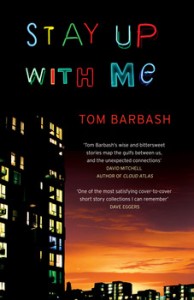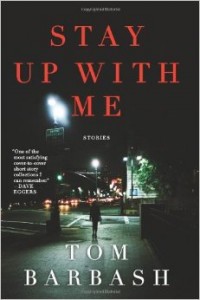 Published by Simon and Schuster UK August 2014, Ecco US
Published by Simon and Schuster UK August 2014, Ecco US
209pp, hardback, £12.99
Reviewed by Sara Maitland
It is always very pleasing to see a mainstream commercial publisher produce – and in hardback – a single-author collection of short stories, especially from someone who is not a bestselling novelist already. It does not happen often enough and should be celebrated. (Barbash has written a novel, The Last Good Chance, but back in 2002 and it does not seem to have been published in the UK; he also wrote a notable non-fiction book, On Top of the World, about 9/11, but still Simon & Schuster – and of course he – deserve praise for this book.)
And these stories are very good – classic slice-of-life realism, written with a delicate touch and some great wry humour. I think that they would be even better for North Americans too, because I had a repeated feeling that I was failing to de-code careful social detail in turns of phrase, possessions, locations or family histories. They are precision honed, well thought through and beautifully constructed: the endings, so often a problem in this kind of short story, are especially strong. The final two pages of ‘Birthday Girl’, for example, are faultless, exemplary – I bet I find myself telling my creative writing students to read it. (This incidentally is my favourite story and I can’t tell you what happens in any way which would not ‘spoil’ it, but I can say that it uses the second person and present tense, always such a tricky voice to pull off, to perfect effect – pulling the reader into understanding and emotional engagement, creating a genuine ‘there but for fortune’ mood which is exactly right for the topic. At a technical level this is utterly impressive.)
The thirteen stories are fairly tightly themed (or slightly ‘samey’, depending on how you take this): so they lack a wide emotional range, but gain a consistent ‘view’ of the emotional terrain Barbash feels we are ‘all’ somehow travelling through: the ways we try and usually fail to connect with one-another; the ways we negotiate our own space in the world. When the cover blurb of a book uses the term ‘bittersweet’, it usually means ‘mawkish-but-intelligently-so’, but actually he slips along the edge of sentimentality with extraordinary grace, examining a series of tiny moments of touching mis-connection, moral error, social confusion and non-tragic sadness. I have some trouble with this since I do not personally believe that all our emotional life revolves around love and sex: there are work and friendship and bad weather too, as well as ill health, hilarity, intellectual confusion, and meaningful groups larger than ‘the couple’. So for me these are wonderfully wrought stories with real sensitive knowingness about a part of life nothing like as important as he makes it feel. However I see no reason why Barbash should not focus on a single particular area of human life if that is where his inclination or imagination leads him, when he does it so well.
But . . . (looking back at what I have written I can see that this ‘but’ has been lurking in waiting, in what was meant to be real praise and admiration) . . . I am left with a strong sense of ‘so-what?’. Acute observation is to be respected; delicate wit is to be enjoyed; craft excellence and technical accomplishment are to be sincerely and deeply admired – but in the end it does not feel like quite enough to me. The great strength of the short story has always been its capacity to break the boundaries of its form, to be genuinely ‘experimental’, to do something new with form and language. (I suspect that this is because it takes so much less time to write and to read than a novel does: the writer can afford to fail, the reader can afford to ‘give it a go’.) Stay Up With Me does not even attempt to move into that challenging, exciting place, neither in its subject matter nor its formal concerns. These stories are described in the long list of plaudits with which the collection begins as ‘Cheever-esque’ or might have been written by Raymond Carver. Both those excellent and in their day profoundly innovative writers have been dead for over quarter of a century – this should not be a compliment to a new collection of short stories.
I feel this is a collection to read should you be recovering from the flu – the stories will match your mood and your desire for something pleasing but not too difficult. When so few collections of contemporary short stories are being published (and when such creative bold stories are being written) this does not seem somehow fully satisfying.
